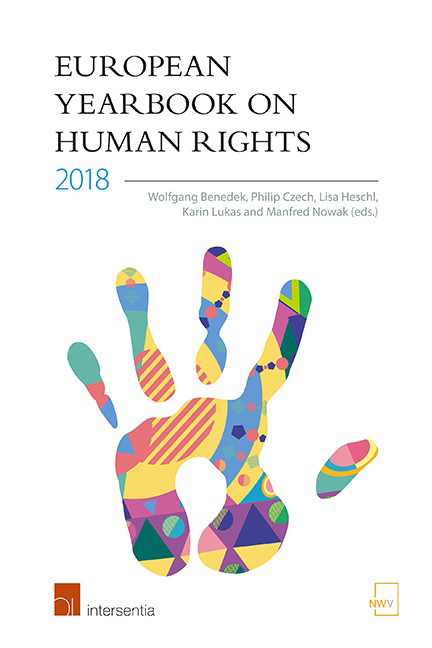Book contents
- Frontmatter
- Scientific Advisory Board
- Editors’ Preface
- Contents
- List of Abbreviations
- List of Contributors
- Part I Topic Of The Year
- Part II Eu
- The Court of Justice of the European Union and Human Rights in 2017
- Understanding Resettlement Through the Prism of Human Rights: A Case Study on the Resettlement in Belgium of Syrian Refugees from Lebanon
- The Decline of Fundamental Rights in CJEU Jurisprudence after the 2015 ‘Refugee Crisis’
- The EU Migration Crisis and the Human Rights Implications of the Externalisation of Border Control
- Does the EU Framework for Roma Integration Promote the Human Rights of Romani Persons in the Union?
- The EU Guidelines on Freedom of Religion or Belief at Their Fifth Anniversary: Implementation Lagging Behind?
- Human Rights Council in Troubled Waters: The EU as a Stabilising Factor
- Part III Coe
- PART IV OSCE
- Part V Others
- Part VI Book Reviews
- Index
The EU Guidelines on Freedom of Religion or Belief at Their Fifth Anniversary: Implementation Lagging Behind?
from Part II - Eu
Published online by Cambridge University Press: 31 January 2019
- Frontmatter
- Scientific Advisory Board
- Editors’ Preface
- Contents
- List of Abbreviations
- List of Contributors
- Part I Topic Of The Year
- Part II Eu
- The Court of Justice of the European Union and Human Rights in 2017
- Understanding Resettlement Through the Prism of Human Rights: A Case Study on the Resettlement in Belgium of Syrian Refugees from Lebanon
- The Decline of Fundamental Rights in CJEU Jurisprudence after the 2015 ‘Refugee Crisis’
- The EU Migration Crisis and the Human Rights Implications of the Externalisation of Border Control
- Does the EU Framework for Roma Integration Promote the Human Rights of Romani Persons in the Union?
- The EU Guidelines on Freedom of Religion or Belief at Their Fifth Anniversary: Implementation Lagging Behind?
- Human Rights Council in Troubled Waters: The EU as a Stabilising Factor
- Part III Coe
- PART IV OSCE
- Part V Others
- Part VI Book Reviews
- Index
Summary
ABSTRACT
When the European Union (EU) Guidelines on Freedom of Religion or Belief (FoRB) were adopted in 2013, they were applauded as an advancement of EU commitments to FoRB. The Guidelines sparked the hopes of both academics and practitioners in the field that FoRB would be placed higher on the EU agenda.
Although five years have passed since the adoption of the EU Guidelines on Freedom of Religion or Belief (EU Guidelines on FoRB), and despite the EU‘s commitment to evaluate implementation three years after their adoption, the Working Party on Human Rights in the Council (COHOM) has not produced any publicly available document to date. Such a situation lends itself to two hypotheses: either (a) reports on the implementation do exist institutionally, but are not made public (in which case, issues of transparency and weak inter-institutional and civic dialogue arise), or (b) no report on the implementation has been drawn up (in which case COHOM is in breach of its commitments set out by the EU Guidelines on FoRB).
This article will show that, in either case, the EU is not respecting its commitments in the area of FoRB. The research will also put forward recommendations on how the EU could make better and more efficient use of the EU Guidelines on FoRB.
INTRODUCTION
The Maastricht Treaty, adopted in 1992, enshrined human rights into treaty obligations of the Union and of Member States. Although the Maastricht Treaty does not bind the Union to a specific list of human rights, it sets the ground for subsequent treaties to articulate and crystallise the human rights obligations incumbent on the Union and on Member States. More visibly, the Treaty of Lisbon enshrined the EU‘s commitment to promoting and securing human rights and fundamental freedoms in its external action, stating that the EU:
Shall be guided by the principles which have inspired its own creation […] and which it seeks to advance in the wider world: democracy, the rule of law, the universality and indivisibility of human rights and fundamental freedoms, respect for human dignity, the principles of equality and solidarity, and respect for the principles of the United Nations Charter and international law.
It also commits the EU to a ‘ high degree of cooperation ‘ intended to bring coherence and consistency between the internal and external actions of the EU.
- Type
- Chapter
- Information
- European Yearbook on Human Rights 2018 , pp. 193 - 210Publisher: IntersentiaPrint publication year: 2018



